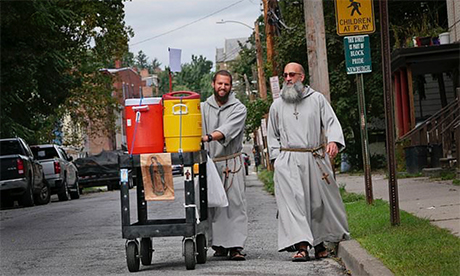Sidewalk prayers near shoot-up spots. Sunday sermons in the back of a bar. Pleas to struggling souls to surrender to God. Funerals for members of their flock who didn’t make it.
Clergy members have become spiritual first responders in the opioid crisis, often leaving the pulpit to minister on the streets.
They can be reverends, rabbis, priests or pastors.
Though their faiths differ, they invariably approach people with addiction as equals.
No Bible-thumping, no blaming.
Quite a few are in recovery themselves.
Despite some signs of a slowdown, the nation’s all-time deadliest drug overdose epidemic endures.
Opioids were involved in most of the deaths, killing nearly 48,000 people last year.
A spiritual element to recovery is familiar to people who have worked 12-step programs, with their references to an undefined higher power.
Scientific studies have found evidence that religious faith can help substance abusers with their recovery.
Working with addicted people means trips to hospital rooms and fresh graves. But there are flashes of light in the darkness, too.
Three dispatches from the front lines:
A church for imperfect people
Nine minutes into his sermon, Pastor Brad Hill made a confession.
“I gotta be honest. I ask myself a lot of the times, ‘God, why did you allow me to be an addict?” Hill says from the pulpit of his Grace Downtown Church.
“Why are my friends dying of an overdose? …
I gotta ask God, ‘Why, God, do you allow this?'”
Hill hears those questions a lot.
The church Hill started in the back of a Winchester, Virginia, bar moved this year to a space that can accommodate hundreds, many trying to turn the page on their addictions.
Six and a half years in recovery, Hill calls it a totally judgment-free zone, “a church for imperfect people.”
Hill has a salty beard, smiling eyes and booming voice to sermonize about the suffering he sees so often in the Shenandoah Valley.
His phone lights up constantly with messages from struggling people and their loved ones. One recent text read: “Do those who commit suicide still go to heaven?”
Too often, Hill speaks at funerals for overdose victims, three in the past three months alone.
He honors the dead while telling survivors, “You don’t have to be like this person. There is a way out.”
A funeral in September for a 38-year-old married father of four was especially hard on Hill.
They were friends, and Hill had been talking to him about his struggle just a week before he died.
It was Hill who welcomed the man’s grieving family to a Sunday service.
“They lost one of …” Hill swallowed, clapped his hands together twice, and continued in a softer voice.
“They lost one of my favorite people. So I just ask that we pray real quick for them, OK?”
Clergy members have become spiritual first responders in the opioid crisis, often leaving the pulpit to minister on the streets.
Hill’s own addiction to painkillers led to a prescription fraud conviction in 2007 and a yearlong jail sentence that cost him a thriving church in Virginia Beach. Continue reading
- Image: America
